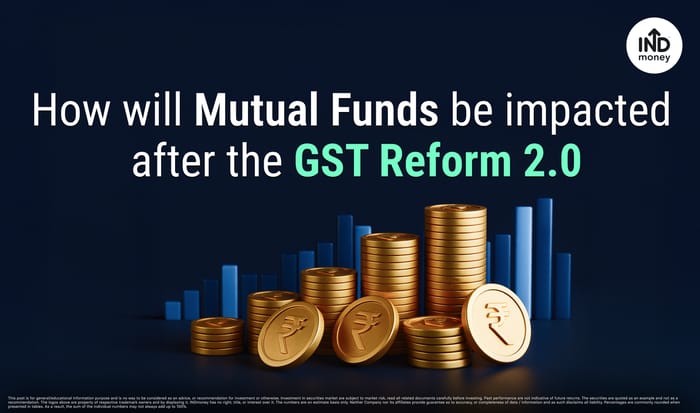
Finance Minister Nirmala Sitharaman recently announced significant GST reforms, including the rationalisation of rates and the introduction of a simpler two-slab structure. These changes, dubbed "GST 2.0," will take effect from September 22, 2025, streamlining the current four slabs (5%, 12%, 18%, 28%) into a more concise 5% and 18% system. A special 40% slab is also proposed for select items, such as high-end cars and tobacco.
According to SBI Research, these reforms could add about ₹1.98 lakh crore to consumption in FY26. When combined with earlier income tax cuts, total consumer spending could rise by an impressive Rs 5.31 lakh crore, equivalent to 1.6% of India's GDP. This widespread impact naturally raises a crucial question for investors: How will these GST reforms affect mutual funds?
In this blog, we'll delve into the specifics of how various sectors are impacted by GST 2.0 and subsequently, how mutual funds, with their diverse portfolios and sector weightages, are likely to fare.
Key Sectors to Watch Post-GST 2.0
The approved measures are expected to yield economy-wide benefits, favorably impacting several key sectors. Here are some of the major segments that will experience significant shifts:
- Automobiles: Across most segments, the automobile sector is set to benefit. This is a positive sign for manufacturers like Maruti, M&M, and Ashok Leyland.
- Consumer Durables: Products such as RACs, TVs above 32 inches, and dishwashers will see a boost in demand due to potential price reductions. Companies like Havells, Voltas, and Blue Star are well-positioned.
- Consumer Staples: Food, fruit drinks, and Home & Personal Care (HPC) items are expected to see increased consumption. This is good news for companies like HUVR and Britannia.
- Cement: While the sector is sentimentally positive, a possible price reduction of 7.5-8% is anticipated. The increase in GST on coal to 18% (from 5%) is largely offset by the merger of the green energy cess with GST, making the overall impact largely neutral for the sector. Ultratech and JK Cement are key players here.
- Insurance (Retail Health and Life): This sector is a direct beneficiary, with a lower indirect tax burden and direct tax rate supporting consumption demand and aiding credit growth. SBI Life, HDFC Life Insurance, ICICI Prudential Life Insurance, Axis Max Life Insurance, Star Health, Niva Bupa, and NIACL are among the companies that will benefit.
- Retail (Footwear, Apparel – below INR2,500 price, Electronic Retailers): These segments are expected to see increased demand due to more favourable tax structures. Metro and Trent are examples of companies that could benefit.
- Banks & NBFCs: As a second-order beneficiary of improved consumption demand and economic activities, the banking sector is expected to be positively impacted. Household confidence and demand for debt should rise, leading to double-digit credit growth in 2HFY26. This directly benefits consumer-heavy lenders and credit card players like ICICI Bank, HDFC Bank, IDFC First Bank, Bajaj Finance, and Shriram Finance.
Other sectors like Hotels (sub-INR7,500 room rate inventory), Renewables (solar cells), Oil & Gas (through CNG cars), Logistics, Quick Commerce, and EMS (better demand for ACs) are also poised for positive impacts.
The Mutual Fund Impact
Now, let's connect these sectoral shifts to your mutual fund investments. Mutual funds, by their very nature, invest across various sectors and companies. Therefore, the performance of these funds will be directly influenced by the positive and negative impacts on the underlying sectors and stocks.
Many top mutual funds have significant exposure to the key impacted sectors. For instance, Axis Securities has coverage on a majority of FMCG companies, all Cement Companies, Maruti, TVS Motors, Hero Motocorp, UNO Minda, Trent, Avenue Supermart, Doms Industries, Relaxo, Westlife Foodworld, Inox Wind, SBI Life, Bajaj Finance, and SBI Cards.
Looking at some of the prominent mutual funds:
- Motilal Oswal Large Cap Fund: Has a 24.8% allocation to the Banking sector.
- Parag Parikh Flexi Cap Fund: Holds 19.81% in the Banking sector.
- HDFC Flexi Cap Fund: A significant 35.08% in the Banking sector.
- Nippon India Large Cap Fund: Allocates 22.81% to the Banking sector.
- ICICI Prudential Large Cap Fund: Has 22.61% in the Banking sector.
As you can see, most of these top mutual funds have substantial weightages in sectors like Banking, which is positively impacted by the GST reforms. Similarly, their exposure to other benefiting sectors like FMCG, Insurance, and Automobiles will likely contribute positively to their performance.
The strategic allocation of these mutual funds across various sectors means that they are well-positioned to capitalise on the increased consumption and economic activity spurred by GST 2.0. Investors in these funds can anticipate potential benefits as the reforms take full effect.
Disclaimer: The content is meant for education and general information purposes only. Past performance is not indicative of future returns. Mutual Funds are non-exchange traded products, and INDstocks is merely acting as a mutual fund distributor. All disputes with respect to distribution activity, would not have access to the exchange investor redressal forum or arbitration mechanism. Mutual Fund investments are subject to market risks, read all scheme related documents carefully before investing. INDstocks Private Limited (formerly known as INDmoney Private Limited) 616, Level 6, Suncity Success Tower, Sector 65, Gurugram, 122005, SEBI Stock Broking Registration No: INZ000305337, Trading and Clearing Member of NSE (90267, M70042) and BSE, BSE StarMF (6779), AMFI Registration No: ARN-254564, SEBI Depository Participant Reg. No. IN-DP-690-2022, Depository Participant ID: CDSL 12095500, Research Analyst Registration No. INH000018948 BSE RA Enlistment No. 6428.